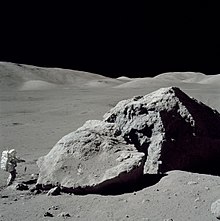Planetary geology

Planetary geology, alternatively known as astrogeology or exogeology, is a planetary science discipline concerned with the geology of the celestial bodies such as the planets and their moons, asteroids, comets, and meteorites. Although the geo- prefix typically indicates topics of or relating to the Earth, planetary geology is named as such for historical and convenience reasons. Due to the types of investigations involved, it is also closely linked with Earth-based geology.
Planetary geology includes such topics as determining the internal structure of the terrestrial planets, and also looks at planetary volcanism and surface processes such as impact craters, fluvial and aeolian processes. The structures of the giant planets and their moons are also examined, as is the make-up of the minor bodies of the solar system, such as asteroids, the Kuiper Belt, and comets.
History of planetary geology
Eugene Shoemaker is credited with bringing geologic principles to planetary mapping and creating the branch of planetary science, the Astrogeology Research Program, within the U.S. Geological Survey. He made important contributions to the field and the study of impact craters, Lunar Science, asteroids, and comets[1].
Today many institutions are concerned with the study and communication of planetary sciences and planetary geology. The Visitor Center at Barringer Meteor Crater near Winslow, Arizona includes a Museum of planetary geology.[citation needed]
Major centers for planetary science research include the Lunar and Planetary Institute, the Applied Physics Laboratory, thePlanetary Science Institute, the Jet Propulsion Laboratory, Southwest Research Institute, and Johnson Space Center. Additionally, several universities conduct extensive planetary science research, including Brown University, the University of Arizona, Caltech, MIT, and Washington University in St. Louis.
See also
- Geological features of the solar system
- Geological history of Earth
- Geology of Mercury
- Geology of Venus
- Geology of the Moon
- Geology of Mars
- Geology of Callisto
- Geology of Europa
- Geology of Ganymede
- Geology of Io
- Geology of Titan
- Geology of Triton
- Geology of Pluto
References
Additional Reading
- J. F. Bell III, B. A. Campbell, M. S. Robinson (2004). Remote Sensing for the Earth Sciences: Manual of Remote Sensing (3rd ed.). John Wiley & Sons. Retrieved 2006-08-23.
{{cite book}}: CS1 maint: multiple names: authors list (link) - Roberge, Aki (1998-04-21). "The Planets After Formation". Department of Terrestrial Magnetism. Archived from the original on 2006-08-13. Retrieved 2006-08-23.
